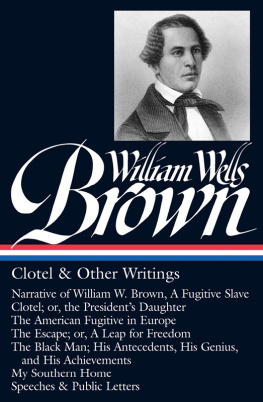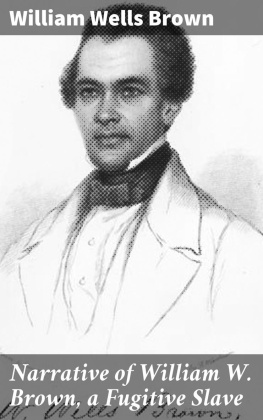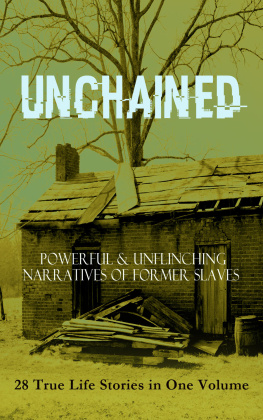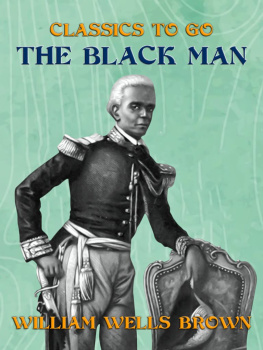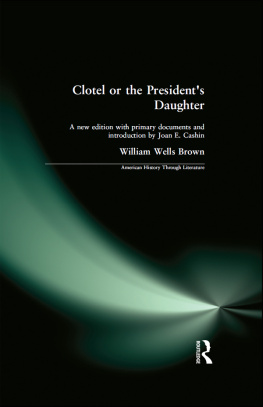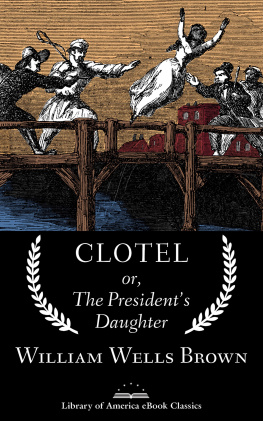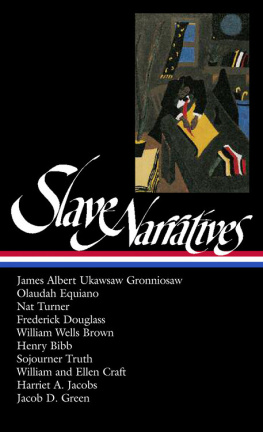Brown - William Wells Brown
Here you can read online Brown - William Wells Brown full text of the book (entire story) in english for free. Download pdf and epub, get meaning, cover and reviews about this ebook. year: 2014, publisher: Library of America, genre: Non-fiction. Description of the work, (preface) as well as reviews are available. Best literature library LitArk.com created for fans of good reading and offers a wide selection of genres:
Romance novel
Science fiction
Adventure
Detective
Science
History
Home and family
Prose
Art
Politics
Computer
Non-fiction
Religion
Business
Children
Humor
Choose a favorite category and find really read worthwhile books. Enjoy immersion in the world of imagination, feel the emotions of the characters or learn something new for yourself, make an fascinating discovery.
- Book:William Wells Brown
- Author:
- Publisher:Library of America
- Genre:
- Year:2014
- Rating:3 / 5
- Favourites:Add to favourites
- Your mark:
- 60
- 1
- 2
- 3
- 4
- 5
William Wells Brown: summary, description and annotation
We offer to read an annotation, description, summary or preface (depends on what the author of the book "William Wells Brown" wrote himself). If you haven't found the necessary information about the book — write in the comments, we will try to find it.
Brown: author's other books
Who wrote William Wells Brown? Find out the surname, the name of the author of the book and a list of all author's works by series.
William Wells Brown — read online for free the complete book (whole text) full work
Below is the text of the book, divided by pages. System saving the place of the last page read, allows you to conveniently read the book "William Wells Brown" online for free, without having to search again every time where you left off. Put a bookmark, and you can go to the page where you finished reading at any time.
Font size:
Interval:
Bookmark:


Ezra Greenspan, editor

THE LIBRARY OF AMERICA
Volume compilation, notes, and chronology copyright 2014 by
Literary Classics of the United States, Inc., New York, N.Y.
All rights reserved.
No part of the book may be reproduced commercially
by offset-lithographic or equivalent copying devices without
the permission of the publisher.
Some of the material in this volume is reprinted
by permission of the holders of copyright and publication rights.
See Note on the Texts on for acknowledgments.
THE LIBRARY OF AMERICA, a nonprofit publisher, is dedicated to publishing, and keeping in print, authoritative editions of Americas best and most significant writing. Each year the Library adds new volumes to its collection of essential works by Americas foremost novelists, poets, essayists, journalists, and statesmen.
If you would like to request a free catalog and find out more about The Library of America, please visit with your name and address. Include your e-mail address if you would like to receive our occasional newsletter with items of interest to readers of classic American literature and exclusive interviews with Library of America authors and editors (we will never share your e-mail address).
Library of Congress Control Number: 2013941525
ISBN 9781598532913 (print)
ISBN 9781598533149 (epub)
OF
WRITTEN BY HIMSELF.

Is there not some chosen curse,
Some hidden thunder in the stores of heaven,
Red with uncommon wrath, to blast the man
Who gains his fortune from the blood of souls?
COWPER.

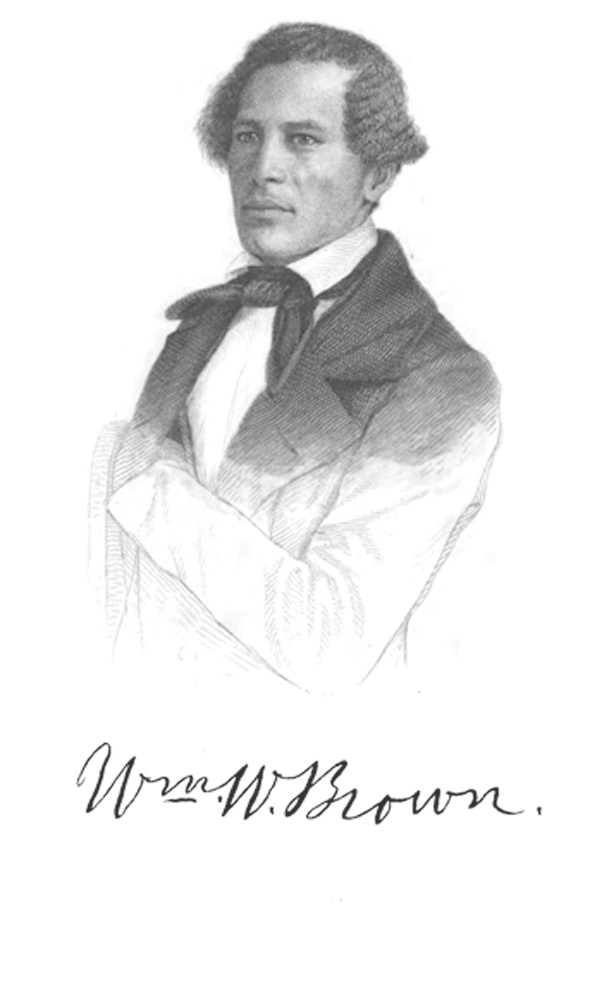
T HIRTEEN years ago, I came to your door, a weary fugitive from chains and stripes. I was a stranger, and you took me in. I was hungry, and you fed me. Naked was I, and you clothed me. Even a name by which to be known among men, slavery had denied me. You bestowed upon me your own. Base indeed should I be, if I ever forget what I owe to you, or do anything to disgrace that honored name!
As a slight testimony of my gratitude to my earliest benefactor, I take the liberty to inscribe to you this little Narrative of the sufferings from which I was fleeing when you had compassion upon me. In the multitude that you have succored, it is very possible that you may not remember me; but until I forget God and myself, I can never forget you.
Your grateful friend,
WILLIAM WELLS BROWN.
EDMUND QUINCY, ESQ.
DEDHAM, JULY 1, 1847.
TO WILLIAM W. BROWN.
MY DEAR FRIEND:I heartily thank you for the privilege of reading the manuscript of your Narrative. I have read it with deep interest and strong emotion. I am much mistaken if it be not greatly successful and eminently useful. It presents a different phase of the infernal slave-system from that portrayed in the admirable story of Mr. Douglass, and gives us a glimpse of its hideous cruelties in other portions of its domain.
Your opportunities of observing the workings of this accursed system have been singularly great. Your experiences in the Field, in the House, and especially on the River in the service of the slave-trader, Walker, have been such as few individuals have had;no one, certainly, who has been competent to describe them. What I have admired, and marvelled at, in your Narrative, is the simplicity and calmness with which you describe scenes and actions which might well move the very stones to rise and mutiny against the National Institution which makes them possible.
You will perceive that I have made very sparing use of your flattering permission to alter what you had written. To correct a few errors, which appeared to be merely clerical ones, committed in the hurry of composition, under unfavorable circumstances, and to suggest a few curtailments, is all that I have ventured to do. I should be a bold man, as well as a vain one, if I should attempt to improve your descriptions of what you have seen and suffered. Some of the scenes are not unworthy of De Foe himself.
I trust and believe that your Narrative will have a wide circulation. I am sure it deserves it. At least, a man must be differently constituted from me, who can rise from the perusal of your Narrative without feeling that he understands slavery better, and hates it worse, than he ever did before.
I am, very faithfully and respectfully,
Your friend,
EDMUND QUINCY.
T HE FRIENDS of freedom may well congratulate each other on the appearance of the following Narrative. It adds another volume to the rapidly increasing anti-slavery literature of the age. It has been remarked by a close observer of human nature, Let me make the songs of a nation, and I care not who makes its laws; and it may with equal truth be said, that, among a reading people like our own, their books will at least give character to their laws. It is an influence which goes forth noiselessly upon its mission, but fails not to find its way to many a warm heart, to kindle on the altar thereof the fires of freedom, which will one day break forth in a living flame to consume oppression.
This little book is a voice from the prison-house, unfolding the deeds of darkness which are there perpetrated. Our cause has received efficient aid from this source. The names of those who have come from thence, and battled manfully for the right, need not to be recorded here. The works of some of them are an enduring monument of praise, and their perpetual record shall be found in the grateful hearts of the redeemed bondman.
Few persons have had greater facilities for becoming acquainted with slavery, in all its horrible aspects, than WILLIAM W. BROWN. He has been behind the curtain. He has visited its secret chambers. Its iron has entered his own soul. The dearest ties of nature have been riven in his own person. A mother has been cruelly scourged before his own eyes. A father,alas! slaves have no father. A brother has been made the subject of its tender mercies. A sister has been given up to the irresponsible control of the pale-faced oppressor. This nation looks on approvingly. The American Union sanctions the deed. The Constitution shields the criminals. American religion sanctifies the crime. But the tide is turning. Already, a mighty under-current is sweeping onward. The voice of warning, of remonstrance, of rebuke, of entreaty, has gone forth. Hand is linked in hand, and heart mingles with heart, in this great work of the slaves deliverance.
The convulsive throes of the monster, even now, give evidence of deep wounds.
The writer of this Narrative was hired by his master to a soul-driver, and has witnessed all the horrors of the traffic, from the buying up of human cattle in the slave-breeding States, which produced a constant scene of separating the victims from all those whom they loved, to their final sale in the southern market, to be worked up in seven years, or given over to minister to the lust of southern
Font size:
Interval:
Bookmark:
Similar books «William Wells Brown»
Look at similar books to William Wells Brown. We have selected literature similar in name and meaning in the hope of providing readers with more options to find new, interesting, not yet read works.
Discussion, reviews of the book William Wells Brown and just readers' own opinions. Leave your comments, write what you think about the work, its meaning or the main characters. Specify what exactly you liked and what you didn't like, and why you think so.

